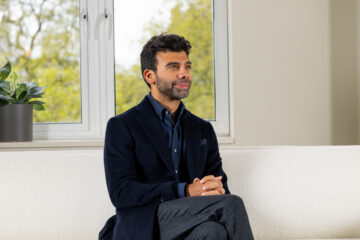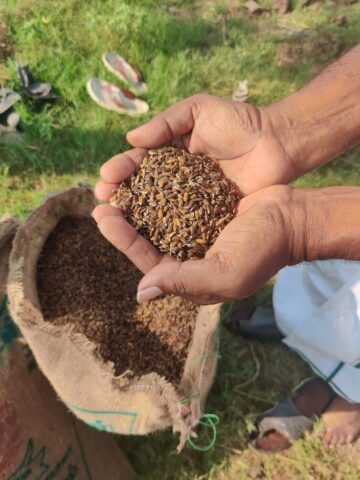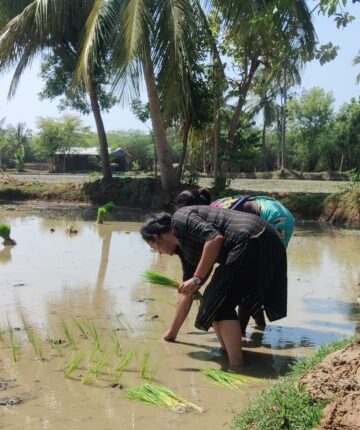Donor’s Gift Supports Students’ International Research
June 17, 2024
By Katya Hrichak

International fieldwork is essential for some doctoral students’ dissertation research, but for many, funding travel and expenses is a challenge. Recognizing the importance of extended, in-country research, Amit Bhatia ’01 created a fund to help close these gaps.
The Amit Bhatia ’01 Global Ph.D. Research Scholars program, administered through the Mario Einaudi Center for International Studies, part of Global Cornell, supports six to seven graduate students annually as they conduct up to a year of international fieldwork to finish their dissertations. The opportunity is open to post-A exam doctoral candidates from all fields and disciplines for whom international fieldwork is critical to their dissertation research.
“When I learned about the challenges graduate students have in securing funding for international research projects, I wanted to help. I wanted to ensure that students eager to study remote or significant areas of our world did not have insurmountable hurdles,” said Bhatia.

“Establishing the Scholars Fund was a way for me to support students, support interesting new research projects around the world, and keep a strong international flavor on campus. I was also excited to make a difference for each of these students in their academic careers,” he said.
Anjana Ramkumar, an international development studies doctoral candidate, found the Bhatia Global Ph.D. Research Award to be essential to her degree progress.
“The generous support of the Bhatia Global Ph.D. Research Award was particularly valuable for me as an international student,” Ramkumar said. “Given that international students are not eligible to apply for several external grants to support their fieldwork, and that the ones that we are eligible for also tend to be highly competitive, the support offered by the Einaudi Center through this award is key in allowing students like me to carry out substantial international field research.”
Ramkumar’s grant supported nine months in Tamil Nadu, India studying traditional rice cultivation through qualitative research including interviews, observation, on-farm activities, and off-farm events.
“The Bhatia Global Ph.D. Research Award was integral in allowing me to do fieldwork for this extended duration of time,” she said.
Itamar Haritan, a doctoral candidate in anthropology who conducted research in Israel and Poland on members of the Lubliner Jewish Organization and Family Constellation practitioners, agreed.

“This award made it possible for me to conduct a full year of fieldwork without obsessing over a food and housing budget. It made it possible for me to travel the length and breadth of the country to gather stories and conduct ethnographic observations without needing to draw on my savings,” he said.
Shirley Le Penne, a doctoral candidate in government who traveled to Paris and Marseille, France, used her award for international and local travel, living expenses and accommodation, purchasing research items and books, and participating in conferences and other activities essential to her work.
“Benefitting from the Bhatia Global Ph.D. Award was crucial to the feasibility of my research,” she said. “Thanks to the award, I did not have to worry about the costs related to traveling to different locations, as well as being able to purchase a dozen expensive and important books on French law and the French criminal justice system.”
International fieldwork is vital for students with an international component to their dissertation research, but it is beneficial to the university as well.
“This support from Amit has been invaluable to the students and so meaningful to Cornell as an institution with a longstanding tradition of excellence in field-based research. Created at a time when there are fewer and fewer external grants for international work, the Amit Bhatia ’01 Global Ph.D. Research Awards enable graduate students to maintain long-term intellectual and personal commitments in regions around the world,” said Wendy Wolford, vice provost for international affairs and Robert A. and Ruth E. Polson Professor in the department of global development.

“Many of the recipients speak multiple languages and navigate cultural complexities that require sustained qualitative engagement,” she continued. “They have all written beautiful dissertations that illustrate the power of international studies for understanding questions of importance across the local and the global.”
When these students graduate, they take the lessons they learned from their time abroad and apply them beyond their studies, said Bhatia.
“In today’s world, we are all interconnected,” he said. “The global research these students are undertaking is not just to complete their dissertations; it is offering new solutions for difficult problems.”
Gifts of any amount support graduate students in pursuit of their degrees. Visit Cornell’s Giving website to explore your options.
